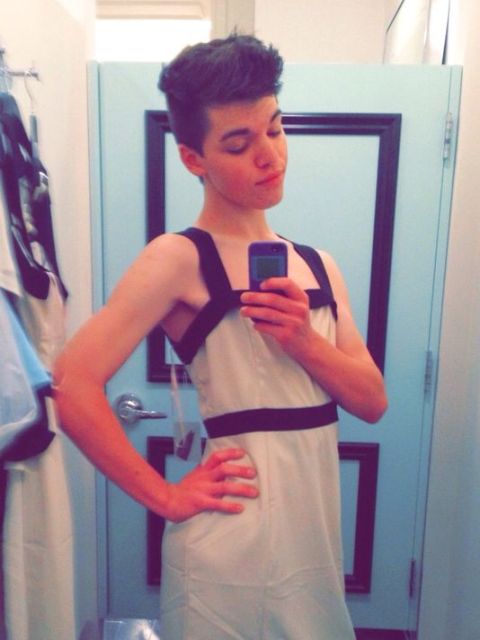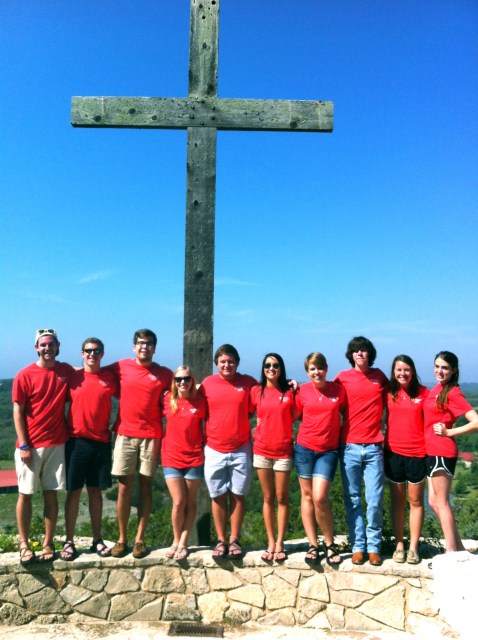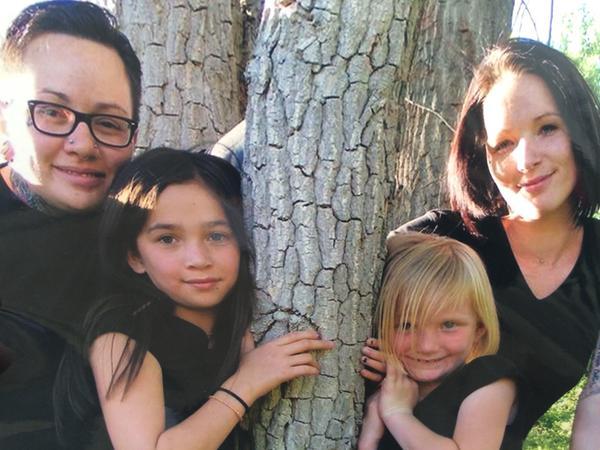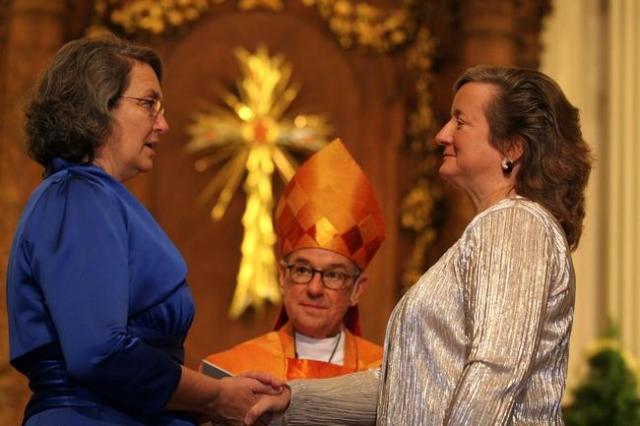“God made Adam and Eve, not Adam and Steve,” she sneered in the way only a 9-year-old can sneer.
“Judge not lest you be judged,” I piped back.
In the woods at Girl Scout camp, I claimed a version of my faith that might have space for queer people. Even back then, I found no connection between a Gospel of saving love and the hatred for LGBT people I read about in the news, the rejection I heard from my peers and the exclusion I saw from the mainstream church. As I was working on coming out to myself in college, I stepped away from the Presbyterian student group I loved and turned to the Bible, trying to figure out how to be my whole self — a lifelong Christian, newly queer, constantly working to give and receive every form of love. First, I drank in the six verses that speak directly (if esoterically) to homosexual behavior. They slid down my throat and burned up my intestines while I cried.
Then I ate a Tums and moved on.
In its 1,000-plus pages, the Bible says very little about same-sex sexual acts and nothing about same-sex relationships. Theologians and queer Christians have explained over and over and over again why these six or seven passages have multiple interpretations and should not be fuel for condemning LGBT people or our relationships. But a theology that promotes a marriage between one man and one woman as the only truly blessed union remains engrained in much of Christian culture. And this exclusive theology extends to other areas — it has been used as justification for employment and housing discrimination, has caused homelessness, and has led to calls for sequestration and even death of LGBT people.
In her suicide note, transgender teen Leelah Alcorn identified Christianity and God as sources of her oppression five times. Her Christian parents, her Christian church and her Christian therapists led her to believe that she could never be happy being trans — meaning she could never be happy at all. Leelah’s story, and so many like hers, demonstrates that we as a church are failing to demonstrate Christ’s love. A theology that kills is bad theology, full stop.

Pastor Danny Cortez, a leader of a Los Angeles church dismissed from the Southern Baptist Convention when the congregation adopted more gay-affirming practices, compared violent, anti-gay theologies to medicine that seems right on paper but actually makes people sick.
“I think too often we look at the LGBT people as an issue. We look at our theology from a petri dish trying to analyze them and fix them. So what I’ve told people is that we have to make a distinction between the scientist and the medical doctor, which is analogous to the theologian and the pastor. As a doctor, the theologian’s kept telling me “keep giving this medicine.” But this one application of scripture is literally killing people and you keep telling me to give it. As a doctor, I’m telling you it’s not working. You guys might know the “Science” but when you bring it to real life practical situations — it doesn’t work. It isn’t bearing good fruit. Because of this, our interpretation needs to be recalled and re-evaluated until it no longer does harm, because that is the end of the commandment.”
Queer Christians and our allies are working to create theologies and practices that affirm our experiences in the family of faith. It often requires great struggle to come to a place of not just reconciling two identities but actively celebrating the way they intertwine and grow together. As our own Mey wrote in her excellent essay “If Joan Of Arc Can Do It, Why Can’t I,”
“I was taught that I am Wonderfully and Fearfully Made, and that means that my transgender body is wonderful and is exactly what God had in mind when They made me. In fact, that thought is one of the things that keeps me going in hard times. God created me to be transgender and queer, and so I have to remember, as the Bible says, if God is for me, who can be against me?”
People like Patrick Cheng, whose book Radical Love I enthusiastically recommend, and Jeff Chu (ditto his memoir Does Jesus Really Love Me) have examined the Bible and church culture and found the ways they celebrate queer love and sex. They and many others have shared their experiences with scripture and shown how it lifts us up and gives a guide for radical living and loving. Their works have shown me scriptures that change my view of the church and myself. But when I’m trying to figure out what it means to be a queer Christian, a complete and beloved person, I turn to 1 John 4:18-21, which states:
“There is no fear in love, but perfect love casts out fear; for fear has to do with punishment, and whoever fears has not reached perfection in love. We love because he first loved us. Those who say, ‘I love God’ and hate their brothers or sisters are liars; for those who do not love a brother or sister whom they have seen cannot love God whom they have not seen. The commandment we have from him is this: those who love God must love their brothers and sisters also.”
If we don’t abundantly love each other, we can’t have an abundant relationship with God. I must embrace an interpretation of my faith that requires unconditional love for queer people because any less would be to deny my own humanity and that of my community. “Love the sinner but hate the sin” fails as a supposedly Christian ideal because it denies the completeness of LGBT people.
Truly inclusive faith community is possible — I’ve seen glimpses of it. A few months after I came out to myself, I was at the college student iteration of the Presbyterian church camp I attended every year during middle school, high school and university. I had a wonderful small group for discussion time, and we spent the week exploring our struggles with faith (and playing very rambunctious games of Couch). I had struggled and succeeded at finding some reconciliation between my bisexuality and my faith, but I was terrified of how my friends would react.
“I am bisexual. I love a girl. I know this is a blessing, but it’s so hard to say that out loud,” I told them on our last night. They showered me with affirmation and light. Every single one of them, friends I’d known for a decade and others I’d known a week, told me the church was still my home, that they were still my family, that I still belonged. My tears of fear turned into ones of thankfulness, and I felt a transformation — my sexuality and faith changed from two identities that tolerated each other to ones that complete each other in my life. This moment came full circle a few months later when another member of our group came out to me.

That embrace expanded last year when the Presbyterian Church USA, the denomination I grew up in, voted to affirm marriage equality. I half-cried in a Managua coffee shop and felt a kind of joy I can only remember experiencing a few times in my life. I don’t care much about marriage equality as a queer political goal, and I have no pending plans to get married myself. But when the 221st General Assembly of the PCUSA voted to allow churches to perform same-sex marriages, I felt grace wash over me. The move demonstrates an embrace of us and the validity of our faith and life, and that matters.
I sometimes think about these two moments and marvel, because I realize how rare it is for an LGBT person who grew up in the church to feel like they belong there, even if they still claim their faith. I’ve been particularly lucky. After I came out publicly, some of the first people to send me messages of support were my pastors, Sunday School teachers and church camp counselors. My longtime friend and Sunday School teacher Judy got emotional when she told me she hoped that my experience at our church, Preston Hollow Presbyterian, hadn’t made it more difficult for me to discover and claim my sexuality. I felt thankful to be able to tell her PHPC was a blessing in my journey as a whole person, not a hindrance. It shouldn’t be so hard for queer Christians to find affirming faith community, but plenty of Christians are fighting hard to keep us out.
In recent years, several major denominations have made big moves to affirm marriage equality, allow ordination of queer clergy, and advance inclusion and celebration of queer people. With these improvements, conservatives have dug in their heels in support of theologies of exclusion and condemnation, in favor of reparative therapy and employment discrimination. Scripture does not justify the kinds of housing and employment discrimination and the physical and emotional violence like ex-gay conversion therapies that many Christians want the right to carry out.
Faith leaders and politicians who rally for the right to exclude queer people from the most basic areas of functioning in society tend to turn to those same few verses, the ones they say condemn same-sex acts or behavior as sinful. It’s never clear from their writings what a queer person’s sexual proclivities have to do with their fitness for employment or housing. A letter asking for Obama to include religious exemptions in last summer’s executive order prohibiting discrimination in federal employment simply referenced “deep religious convictions” but didn’t go into specifics.
A few weeks ago, we learned about the funeral of Denver lesbian Vanessa Collier, which Pastor Ray Chavez interrupted while it was underway to insist that the service could not continue if photos of Vanessa with her wife were on display. Mourners scrambled to move the service to the mortuary across the street. Flagrant disrespect of the dead, of grief, of love — this is one natural outcome of a Christian theology rooted in fear and rejection.

In the Evangelical Protestant tradition there is a great preoccupation with the call to “avoid the appearance of sin,” as Paul writes in Thessalonians (though some theologians contest that translation of the verse). This verse causes much hand wringing over the possibility of sinfulness by association, but the Gospel does not demand that a believer should not associate with a sinful person — Jesus, after all, was frequently castigated by elites for hanging out with prostitutes and tax collectors. So much of mainstream and conservative Christianity gives the feeling that queers are allowed to exist as long as we exist over there and don’t ask for too much. Every few months we hear about another pastor suggesting all the gays should be rounded up in camps or slaughtered, the most extreme variation on the theme.
Last year, international mission organization World Vision found itself at the center of the marriage equality controversy when it announced it would begin accepting staff members in same-sex marriages in its U.S. offices and then reversed the decision after uproar from donors, about 5,000 of whom dropped their sponsorship of the organization. In his response to the organization’s brief move toward inclusion, Albert Mohler, President of the Southern Baptist Convention Seminary, helps elucidate why conservative Christian organizations and leaders are so opposed to having to hire LGBT people.
“Willingly recognizing same-sex marriage and validating openly homosexual employees in their homosexuality is a grave and tragic act that confirms sinners in their sin — and that is an act that violates the gospel of Christ,” Mohler wrote, citing 1 Corinthians 6 about the types of sinners who will not enter Heaven.
Mohler is correct when he writes that the questions World Vision faced are ones that “every Christian ministry, organization, church and denomination will have to face — and soon.” More churches are realizing that the world and Christian faith are transforming — and some of those churches are getting on board. The religious right’s reaction to queer rights gains is more about social control than theology, said Dianna Anderson, a queer theologian and writer based in Sioux Falls, South Dakota whose new book about Christianity and sexuality, Damaged Goods, comes out February 10 .
“A large part of the desire to make something that’s really quite small into such a big issue is the fear of losing their privilege and control in society,” a trend that started in the 60s and 70s, Anderson said. “Evangelicals were pretty apolitical before then, but then they saw that society wasn’t necessarily following their values anymore so they got political after that.”
That’s how we end up with politicians proposing laws that would allow hospitals and schools to turn away gay people. It’s no small part of why 40 percent of homeless youth are LGBT, many of them kicked out of their homes by devoutly Christian families, as Rolling Stone reported in a devastating September feature. A campaign this week called #DiscriminationExists reveals the very real and constant impacts of discriminatory laws against LGBT people, and many of the testimonies refer to religious motivations.
The Bible provides very little scriptural basis for the kind of discrimination some Evangelicals and other Christians are fighting for. However, plenty of scripture calls for economic justice, inclusion and love. Dr. Katharine Henderson, the president of Auburn Theological Seminary, turns to Galatians 3:28 for inspiration: “There is neither Jew nor Gentile, neither slave nor free, nor is there male and female, for you are all one in Christ Jesus.”
Religious leaders have a duty to love and nurture people and protect dignity, Henderson said, and requests to make religious organizations exempt from laws designed to advance equality and human rights don’t live up to that duty.
“We cannot allow any faith tradition to be used as a tool to dismantle the rights of another person,” Henderson said. “Doing so is antithetical to our sacred duty to love and value all people.”
Queer theologians like Cheng and Anderson and allies like Cortez and Henderson have done extensive work to examine scripture and tradition to create theology and practice that celebrate queer people instead of condemning them
More and more Christians are taking a stand in favor of equality. Auburn Theological Seminary, for example, operates Groundswell, a movement building initiative that organizes people for progressive action on immigration, LGBT rights and more. Believe Out Loud is an online (and soon on-the-ground) network for queer Christians and allies. To date, 1,398 people have signed on to their “Discrimination Is Not A Christian Value” pledge.
“People are excited to take a stand, they want to be asked to act on their values,” said Alison Amyx, Believe Out Loud’s senior editor. “They are looking for opportunities to engage more deeply in the LGBT movement.”
Amyx said she’s less concerned about arguing specific scriptures than about looking at the Bible’s overall message of grace and love. The message of the campaign is simple: people of faith should not use that faith to discriminate or exclude anyone. Believe Out Loud frequently receives messages from queer Christians who are learning for the first time that their faith and their sexuality don’t have to exist in conflict. It’s a radical moment for many people, including Amyx, who struggled to come out after growing up in the Southern Baptist tradition.
“I was created in the image of God, and it’s absolutely an expression of my faith that I accept myself as a queer person,” she said.
Believe Out Loud also hosts a searchable database of welcoming Christian congregations. There are many other resources, like Queer Theology’s video series, blogs like Anderson’s, and organizations like Gay Christian Network, Safety Net and The Reformation Project for queer Christians trying to find the intersections of faith and queerness that allow them to celebrate their whole selves. Organizations like Evangelicals for Marriage Equality are dedicated to expanding rights for LGBT people.

Many queer people born into Christianity leave the church and the faith, and there are plenty of valid reasons why. The church has been a place of shame, violence and oppression for so many people, and for others it simply never became home. But I can’t write off the church — for myself, because the Gospel is too imporant a guidepost by which I aim to live my life and do my work; and for others, because reforming the church means reducing the manipulation and violence that so many Christians perpetuate. The church as an institution isn’t going anywhere any time soon, so we who are part of it must work together to build a faith life that validates our experiences and pushes us toward love. We must not wait for straight Christians to make room for us at the table. Perhaps it is time to build a new table and invite them to it, as Eliel Cruz wrote about in an essay sharing his experience at the Gay Christian Network’s conference in January.
After Vanessa Collier’s botched funeral, her friends organized a protest outside New Hope Ministries, the one that didn’t mind taking money from the grieving family of a lesbian woman but didn’t want to risk anyone knowing she was gay. Her longtime friend Jose Silva organized the protest, and he pointed at the church to indicate the pastor when he said “We want to pray that the Lord helps him.”
That is love. That is grace. Christ is in that.
The boldest thing we can do as queer Christians is pray, share communion, and take our place in the church so we can seek and spread theology that brings us to life.





